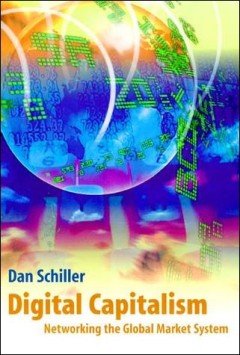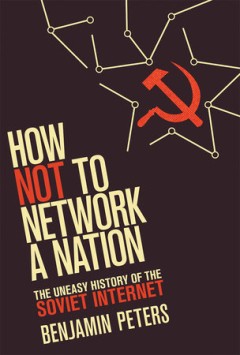Filter by

Digital capitalism: networking the global market system
Schiller traces the transformation of the Internet from government, military, and educational tool to agent of "digital capitalism" through three critically important and interlinked realms.The networks that comprise cyberspace were originally created at the behest of government agencies, military contractors, and allied educational institutions. Over the past generation or so, however, a growi…
- Edition
- -
- ISBN/ISSN
- 9780262283137
- Collation
- 1 online resource (xvii, 294 pages)
- Series Title
- -
- Call Number
- -

How not to network a nation : the uneasy history of the Soviet internet
"Between 1959 and 1989, Soviet scientists and officials made numerous attempts to network their nation -- to construct a nationwide computer network. None of these attempts succeeded, and the enterprise had been abandoned by the time the Soviet Union fell apart. Meanwhile, ARPANET, the American precursor to the Internet, went online in 1969. Why did the Soviet network, with top-level scientists…
- Edition
- -
- ISBN/ISSN
- 9780262334198
- Collation
- 1 online resource (xiii, 298 pages) :illustrations, maps.
- Series Title
- -
- Call Number
- -

Privacy on the line :the politics of wiretapping and encryption
Telecommunication has never been perfectly secure. The Cold War culture of recording devices in telephone receivers and bugged embassy offices has been succeeded by a post-9/11 world of NSA wiretaps and demands for data retention. Although the 1990s battle for individual and commercial freedom to use cryptography was won, growth in the use of cryptography has been slow. Meanwhile, regulations r…
- Edition
- Updated and expanded ed.
- ISBN/ISSN
- 9780262256018
- Collation
- 1 online resource (xvii, 473 pages) :illustrations
- Series Title
- -
- Call Number
- -

The Unreliable Nation: Hostile Nature and Technological Failure in the Cold War
An examination of how technological failures defined nature and national identity in Cold War Canada.OCLC-licensed vendor bibliographic record.
- Edition
- -
- ISBN/ISSN
- 9780262341318
- Collation
- 1 online resource (xi, 287 pages).
- Series Title
- -
- Call Number
- -

Imagining transmedia
"A collection of essays from the Center for Science and the Imagination that combines theory and practice for a critical assesment of the transmedia landscape"--OCLC-licensed vendor bibliographic record.
- Edition
- -
- ISBN/ISSN
- 9780262377508
- Collation
- 1 online resource
- Series Title
- -
- Call Number
- -

Artificial communication :how algorithms produce social intelligence
"Argues that what makes AI socially relevant and useful is not intelligence at all but something even more human: communication. If machines are going to improve their ability to address ever more important human issues, it will not be because they have learned to think like people, but because we have learned to communicate with them"--OCLC-licensed vendor bibliographic record.
- Edition
- -
- ISBN/ISSN
- 9780262368865
- Collation
- 1 online resource.
- Series Title
- -
- Call Number
- -

Visions of a digital nation :market and monopoly in British telecommunications
"Explores how the British telecom system shaped late social democracy and early neoliberalism"--OCLC-licensed vendor bibliographic record.
- Edition
- -
- ISBN/ISSN
- 9780262375528
- Collation
- 1 online resource.
- Series Title
- -
- Call Number
- -

Farm fresh broadband :the politics of rural connectivity
"This study of the political economy of rural broadband combines critical policy analysis with stories of rural Americans and offers solutions for solving the rural-urban digital divide"--OCLC-licensed vendor bibliographic record.
- Edition
- -
- ISBN/ISSN
- 0262367076
- Collation
- 1 online resource.
- Series Title
- -
- Call Number
- -

Designing an internet
Why the Internet was designed to be the way it is, and how it could be different, now and in the future. How do you design an internet The architecture of the current Internet is the product of basic design decisions made early in its history. What would an internet look like if it were designed, today, from the ground up In this book, MIT computer scientist David Clark explains how the Interne…
- Edition
- -
- ISBN/ISSN
- 9780262348508
- Collation
- 1 online resource (432 pages).
- Series Title
- -
- Call Number
- -

The paradoxes of network neutralities
OCLC-licensed vendor bibliographic record.
- Edition
- -
- ISBN/ISSN
- 9780262355070
- Collation
- 1 online resource (528 pages).
- Series Title
- -
- Call Number
- -
 Computer Science, Information & General Works
Computer Science, Information & General Works  Philosophy & Psychology
Philosophy & Psychology  Religion
Religion  Social Sciences
Social Sciences  Language
Language  Pure Science
Pure Science  Applied Sciences
Applied Sciences  Art & Recreation
Art & Recreation  Literature
Literature  History & Geography
History & Geography